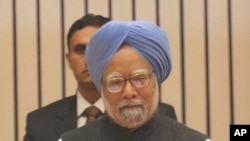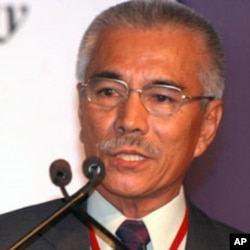Heads of government are meeting in India to discuss climate change. The government leaders hope to make progress toward a climate change treaty following the failed attempt at a summit in Copenhagen in December. The discussions are revealing how difficult it will be to try to achieve consensus at this year's United Nations Framework Convention on Climate Change.
India's Prime Minister, Manmohan Singh, is calling on industrialized countries, as traditional polluters, to do more to reduce future greenhouse gas emissions.
Speaking at the Delhi Sustainable Development Summit, Mr. Singh made clear that for big developing nations, such as his, the proposed solutions must not hinder economic development. "Climate action that delays or makes more difficult the basic task of poverty eradication will be difficult to implement," he said.
India continues to reject calls for binding agreements, something other heads of government at the Delhi summit are supporting - including Greece, Norway and Slovenia.
The United States and China are notably absent at the gathering. Some experts caution that pushing for legally binding carbon caps will be fruitless because such a pact will not be approved by the U.S. Congress.
China also has expressed opposition to legally binding limits on greenhouse gas emissions.
Some of the smallest nations are expected to suffer the worst from the consequences of further emissions. They are making the loudest appeals for drastic action to be taken at this December's global climate summit in Mexico.
Mr. Anote Tong is President of the tiny Pacific island republic of Kirbati, which sits on average just two meters above sea level. He says if a solution is not found to the problem of climate change his country, soon, might literally sink under water.
"I believe that if we are to have any kind of success in regulating or attending to the problem of climate change then we must accept the reality that there has to be a single regulatory authority," he said.
Leaders, such as Jens Stoltenberg of Norway, are pledging to do their part to mitigate the effects of climate change. Prime Minister Stoltenberg told delegates Norway will be carbon neutral by 2030.
The three-day conference includes informal, off-the-record sessions among heads of government and environment ministers - the first such discussions since last December's Copenhagen summit which failed to reach any new global accord.
The Delhi talks come as one of the key sponsors, the U.N.'s Intergovernmental Panel on Climate Change, finds itself on the defensive for recently-revealed errors in its science.
Slovenia President Danilo Turk says despite that, it would be wrong to allow climate change skeptics to take the upper hand. "There obviously might be mistakes and they have to be corrected in the scientific analysis. But the big picture is clear enough and scientific debate should not be confused with sensationalist discussions in the media," he said.
Scientific calculations aside, Bhutan Prime Minister Jigme Thinley told delegates rapid climate change is clearly evident in the Himalayan mountains, which he says have turned brown because of a lack of snowfall.







